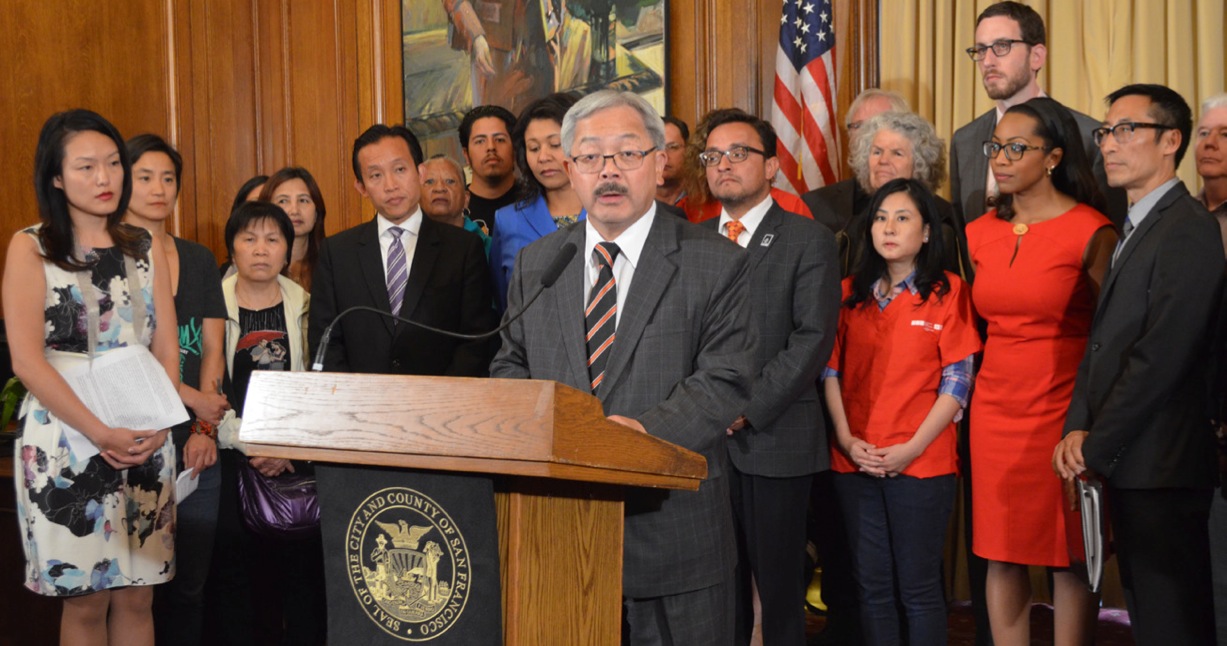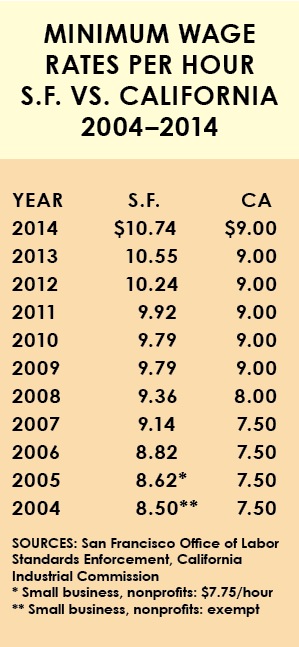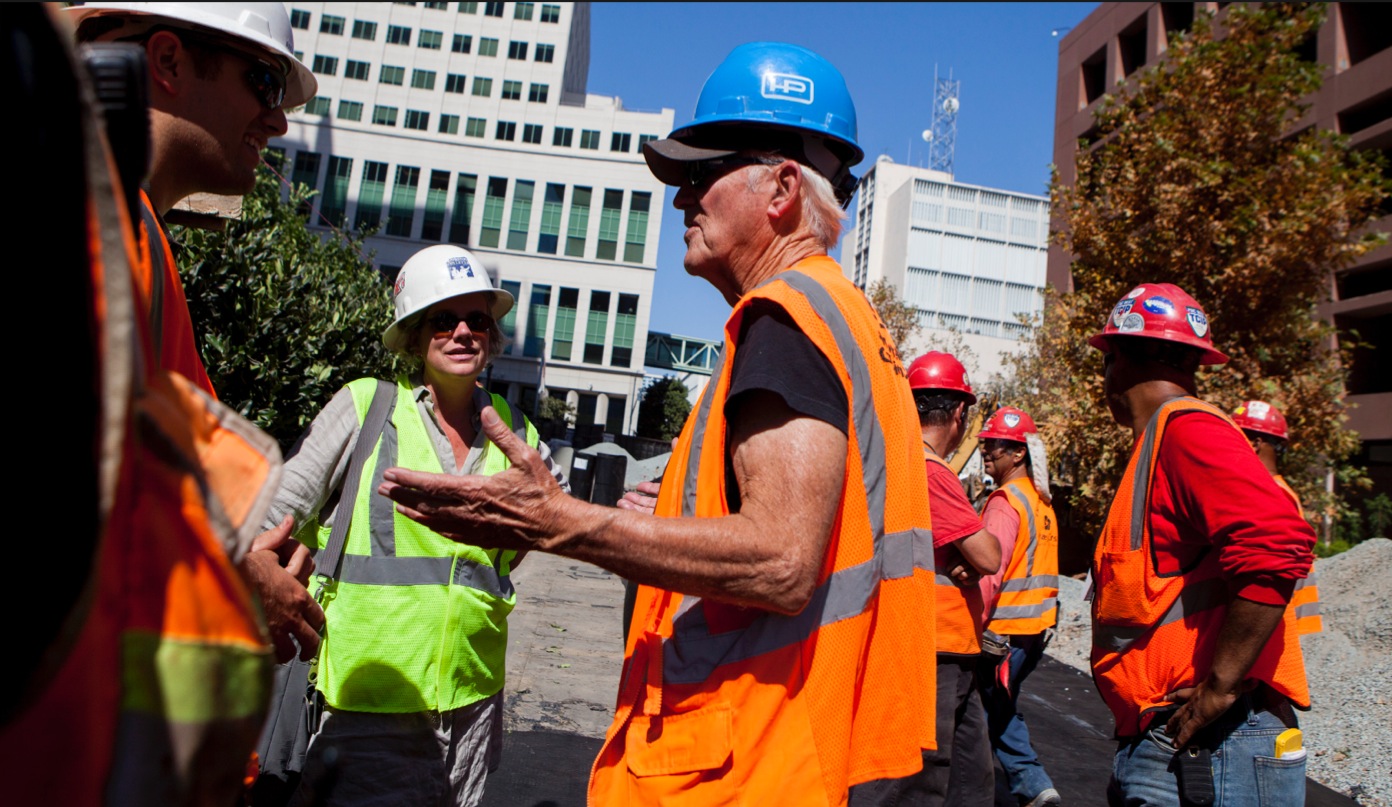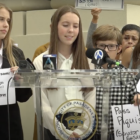San Diego, San Jose avoid Sacramento’s political quagmire, but encounter enforcement problems
The momentum to increase the minimum wage that is building in San Francisco and other localities across California has not caught on for similar statewide efforts.
Two high-profile efforts in Sacramento collapsed this spring, for what could only be described as counterintuitive reasons. Proponents squabbling with members of their own political parties doomed them both.
One proposal was championed by a lifelong Republican who failed to attract the support of his usual allies in the business community. Another faced opposition from the very Democratic legislator who pushed through the latest statewide raise, which hit $9 per hour in July.
So with the Capitol offering no answer to the national clamor for minimum-wage increases coming mostly from organized labor, city halls are stepping up.
The latest effort is in Los Angeles, where Mayor Eric Garcetti is trying to raise the minimum wage there to $13.75 an hour by 2017.
In San Diego, the City Council is trying to save a minimum wage increase to $11.50 per hour by 2017, with smaller increases starting in 2015. Mayor Kevin Faulconer vetoed the initiative but the Council is taking steps to reverse the decision. And Oakland has a proposal on the November ballot to raise the minimum wage to $12.25.
San Francisco’s minimum wage, now $10.74 per hour, could rise to $15 per hour by 2018 in a proposal, Measure J, on the November ballot.
Like San Francisco’s wage, San Diego’s would be pegged to the rate of inflation.
A report released on Aug. 27 by the University of California projected the San Francisco minimum wage measure would boost the pay of 23 per cent of San Francisco workers by an estimated $2,800 a year. African-Americans made up 71 percent of those who stood to benefit, said the UC Berkeley Institute for Research on Labor and Employment report.
Having a strong minimum wage law on the books does not mean all workers receive fair and legal compensation from their employers. But the effort to actually enforce the law will be a significant challenge, requiring the city to conduct audits of noncompliant businesses. City policymakers do not expect the state to be much help.
One council member, Lorie Zapf, said the city would have to create “a little mini-IRS with a significant number of employees to enforce minimum wage,” according to the Voice of San Diego, a nonprofit online news organization.
Officials there want to avoid the sluggish pace of enforcement seen in San Jose, where as-yet-anemic efforts to police the city’s new $10 per hour minimum wage have recovered just $13,000 in back pay for 50 workers since the start of 2014.
San Francisco, with less than four-fifths the population of San Jose, brought in $1.5 million for 349 workers, the Voice of San Diego notes. But that level of effort came at a price, with the city spending nearly that much to investigate and work with community groups to encourage employees to come forward.
The San Francisco Public Press reported in its spring 2013 edition cover story that wage theft is endemic in San Francisco, particularly in immigrant communities. While the Office of Labor Standards Enforcement had recovered wages for about 3,000 workers, experts suggested that violations could be as high as 39,000, based on similar studies in New York, Chicago and Los Angeles.
Failures in Sacramento
Meanwhile, statewide efforts to boost pay for low-wage workers have sputtered.
With elections looming in November, conservative billionaire Ron Unz affirmed he was abandoning his ballot-initiative campaign to raise the minimum wage statewide, even as an ambitious reform proposal by a legislator from San Francisco died in a committee vote.
Senate Bill 935, authored by state Sen. Mark Leno, proposed gradually raising the state minimum wage to $13 per hour by 2017. Despite gaining strong momentum, the bill fell short in a 3-1 vote by the Assembly Committee on Labor and Employment.
At a public hearing, labor advocates and college students asked lawmakers to consider the economic struggles facing working-class Californians.
“I find myself worried more about how I’m going to pay rent, pay my bills and get by more than I am focused on getting a better education for myself,” said Justine Villaseñor, a student at Consumnes River College.
But opponents said the measure would hurt business owners.
“It is too much, too soon,” said Jennifer Barrera, a policy advocate for the California Chamber of Commerce. She said a bill approved last year that enacts a lower minimum-wage hike should be given time to take effect before new efforts advance.
Last year, Assembly Bill 10 raised California’s minimum wage to $9 per hour effective this July and will raise it further to $10 per hour in January 2016. At that point, it will surpass Washington’s to become the highest among all the states — though many local governments set the wage floor higher.
Since joining the Assembly in 2010, Luis Alejo of Watsonville, the bill’s author, made the minimum wage his pet project. Surprisingly, Alejo abstained from voting on the new bill, saying that he struck a carefully balanced compromise with business interests that he did not want to betray.
“I kept my word with all of the stakeholders who were involved in that,” he said. “The bill hasn’t even gone into effect, and here we are moving a bill and going beyond the agreement we reached last year.”
But another study from the UC Berkeley labor institute suggests that Leno’s bill is much stronger than Alejo’s.
Researchers found that Leno’s proposal would have raised wages for more than 35 percent of California’s workforce, generating $22.5 billion for workers by 2017.
In contrast, only 22 percent of California workers are slated to receive raises under Alejo’s law, which will produce $8.2 billion in wages over three years.
The researchers found that most workers affected by both bills were adults — refuting the popular notion that the typical low-wage worker is a teenager in a service or retail job. They also figured that the cost to employers would be small, because lower employee turnover rates and increased productivity would offset the higher wages.
Conservative countermove
The failure of Leno’s bill followed the collapse of another high-profile attempt to raise wages. Unz, a Silicon Valley entrepreneur who once ran for governor as a Republican in the primary against Pete Wilson in 1996, ended his ballot campaign to raise the state minimum wage to $12 by 2016.
Unz, who was trained in theoretical physics, founded Wall Street Analytics, a software company offering financial services. He went on to become publisher of The American Conservative magazine. His initiative spurred national debate because support for a minimum wage increase seemed out of step with his party.
Unz, a self-described conservative libertarian, said social welfare programs like food stamps are a subsidy for employers, allowing them to transfer the cost of doing business to taxpayers.
Higher wages, he argues, turn tax recipients into taxpayers, generating millions in state revenue while reducing government spending.
“Conservatives support cutting social welfare spending — and the taxpayer burden,” Unz said in an interview. “One way to do that is to make employers pay for their workers.”
But he said that despite the media attention, the campaign failed to attract enough financial backing.
Local efforts advance
While statewide initiatives are stalling, efforts to increase the minimum wage hold more promise on a local level, led by San Francisco.
Mayor Ed Lee, city supervisors and labor and business leaders brokered a deal in June to put an initiative on the November ballot to increase the city’s minimum wage to $15 per hour by 2018.
“We had been hearing for a while that it had been challenging at the state level,” said District 6 Supervisor Jane Kim. “But we’ve always been able to fund really critical issues that the state couldn’t.”
Kim said that city officials were aware of the problem and that the supervisors recently supported an increase to the wage-theft enforcement budget.
The proposal includes $200,000 in extra funding for the city’s Office of Labor Standards Enforcement, which would be used for “culturally targeted outreach and community education” mainly in immigrant communities, Kim said.
“We don’t want to pass legislation and not be able to help the people that the legislation is for,” she said.


Part of the summer edition of the San Francisco Public Press. Get yours today.










